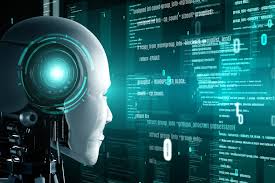The Rise of AI Technology: Transforming the Future
Artificial Intelligence (AI) technology is at the forefront of the digital revolution, transforming industries and reshaping the way we live and work. From healthcare to finance, AI is making a significant impact by enhancing efficiency, accuracy, and innovation.
Understanding AI Technology
AI technology refers to the simulation of human intelligence processes by machines, particularly computer systems. These processes include learning (the acquisition of information and rules for using it), reasoning (using rules to reach approximate or definite conclusions), and self-correction. Key components of AI include machine learning, natural language processing, robotics, and computer vision.
Applications Across Industries
Healthcare: In the healthcare sector, AI is being used to improve diagnostic accuracy, personalise treatment plans, and streamline administrative tasks. Machine learning algorithms can analyse complex medical data to detect patterns that might be missed by human doctors.
Finance: The finance industry benefits from AI through enhanced fraud detection systems, algorithmic trading, and customer service chatbots. By analysing vast amounts of data in real-time, AI can identify unusual patterns that may indicate fraudulent activity.
Retail: In retail, AI helps businesses understand consumer behaviour through data analysis. This allows for personalised recommendations and targeted marketing strategies that enhance customer experience.
The Challenges Ahead
Despite its many benefits, AI technology also presents challenges that need addressing. Ethical concerns about privacy and data security are paramount as more personal information is collected and analysed by AI systems. Additionally, there are fears about job displacement as automation becomes more prevalent across various sectors.
The Future of AI Technology
The future of AI technology holds immense potential for further advancements. As research continues to evolve, we can expect even more sophisticated systems capable of performing complex tasks with greater autonomy. The integration of AI into everyday life will likely continue to grow, offering new opportunities for innovation while necessitating careful consideration of ethical implications.
In conclusion, AI technology is a powerful tool that has the potential to revolutionise numerous aspects of society. By harnessing its capabilities responsibly and ethically, we can unlock new possibilities for progress and development in the years to come.
Exploring AI Technology: Answers to 9 Common Questions
- What is artificial intelligence (AI) technology?
- How is AI technology used in healthcare?
- What are the benefits of AI technology in finance?
- How does AI technology impact job roles and employment?
- What ethical considerations are associated with AI technology?
- Can AI technology replace human decision-making entirely?
- What advancements are being made in machine learning within AI tech?
- Is AI technology capable of creative thinking and problem-solving like humans?
- How can businesses effectively implement AI technology into their operations?
What is artificial intelligence (AI) technology?
Artificial Intelligence (AI) technology refers to the development of computer systems that can perform tasks typically requiring human intelligence. These tasks include learning from experience, understanding natural language, recognising patterns, and making decisions. AI systems utilise algorithms and models to process large amounts of data, enabling them to identify trends and make predictions with remarkable accuracy. The core components of AI include machine learning, where systems improve their performance over time without explicit programming; natural language processing, which allows machines to understand and respond to human language; and computer vision, which enables machines to interpret and make decisions based on visual data. AI technology is rapidly advancing and is being integrated into various sectors such as healthcare, finance, and transportation, fundamentally transforming how these industries operate.
How is AI technology used in healthcare?
AI technology is revolutionising healthcare by enhancing diagnostic accuracy, personalising treatment plans, and streamlining administrative processes. Machine learning algorithms analyse vast amounts of medical data to identify patterns and anomalies that may be missed by human practitioners, leading to earlier and more accurate diagnoses. AI-powered tools assist in developing personalised treatment plans by considering a patient’s unique genetic makeup and medical history. Additionally, AI improves operational efficiency within healthcare facilities by automating routine tasks such as appointment scheduling and patient record management. This allows healthcare professionals to focus more on patient care, ultimately improving outcomes and patient satisfaction.
What are the benefits of AI technology in finance?
AI technology offers numerous benefits in the finance sector, revolutionising how financial institutions operate and serve their customers. One of the primary advantages is enhanced fraud detection; AI systems can analyse vast amounts of transaction data in real-time to identify unusual patterns, helping to prevent fraudulent activities before they cause significant damage. Additionally, AI-driven algorithms facilitate more efficient and accurate risk assessment and management, allowing for better decision-making processes. In customer service, AI-powered chatbots provide instant assistance and support, improving customer satisfaction and reducing response times. Moreover, AI enables personalised financial advice by analysing individual spending habits and financial goals, offering tailored recommendations that help clients manage their finances more effectively. Overall, AI technology contributes to greater efficiency, security, and personalisation in the finance industry.
How does AI technology impact job roles and employment?
AI technology significantly impacts job roles and employment by automating routine and repetitive tasks, which can lead to job displacement in certain sectors. However, it also creates new opportunities by driving innovation and efficiency. As AI takes over mundane tasks, employees can focus on more strategic and creative aspects of their roles, potentially increasing job satisfaction and productivity. Moreover, the rise of AI technology necessitates the development of new skills, leading to the creation of specialised jobs in AI development, maintenance, and oversight. While there is concern about job loss in some industries, the overall effect of AI on employment will likely depend on how businesses and governments manage this transition, emphasising the importance of reskilling and upskilling the workforce to adapt to these changes.
What ethical considerations are associated with AI technology?
Ethical considerations surrounding AI technology are multifaceted and increasingly significant as the technology becomes more integrated into daily life. One major concern is privacy, as AI systems often require vast amounts of personal data to function effectively, raising questions about how this data is collected, stored, and used. There is also the issue of bias, where AI systems can inadvertently perpetuate or even exacerbate existing societal biases if they are trained on biased data sets. Transparency and accountability are crucial, as it can be challenging to understand how AI algorithms make decisions, leading to a lack of accountability when errors occur. Furthermore, the potential for job displacement due to automation raises ethical questions about the responsibility of organisations and governments to support affected workers. Ensuring that AI technology is developed and implemented in ways that are fair, transparent, and respectful of human rights is essential for fostering trust and promoting its positive impact on society.
Can AI technology replace human decision-making entirely?
While AI technology has advanced significantly and can assist in decision-making by providing data-driven insights and analysing complex datasets, it is unlikely to replace human decision-making entirely. AI excels at processing information quickly and identifying patterns that might not be immediately apparent to humans. However, human decision-making involves intuition, empathy, ethical considerations, and understanding of context—elements that AI currently cannot fully replicate. Furthermore, many decisions require a nuanced understanding of human emotions and societal norms, which are beyond the scope of AI capabilities. Therefore, while AI can augment human decision-making by offering valuable support and recommendations, the ultimate responsibility and judgement remain with humans.
What advancements are being made in machine learning within AI tech?
Significant advancements are being made in machine learning, a critical component of AI technology. One key development is the improvement of deep learning algorithms, which have become more efficient and capable of processing vast amounts of data with increased accuracy. Researchers are also making strides in unsupervised learning, enabling machines to identify patterns and make decisions without human intervention. Additionally, the integration of reinforcement learning is allowing AI systems to learn from their environments and optimise their performance through trial and error. These advancements are enhancing AI’s ability to tackle complex tasks across various sectors, from natural language processing to autonomous vehicles, thereby broadening its practical applications and effectiveness.
Is AI technology capable of creative thinking and problem-solving like humans?
AI technology has made significant strides in replicating certain aspects of human-like creative thinking and problem-solving, but it operates fundamentally differently from the human mind. While AI can generate creative outputs, such as composing music or creating art, it does so by analysing vast datasets and identifying patterns rather than through original thought or emotion. In terms of problem-solving, AI excels at processing large amounts of information quickly and offering solutions based on pre-defined algorithms and learned data. However, it lacks the intuitive understanding and contextual awareness that humans possess. Consequently, while AI can assist with creative tasks and complex problem-solving, it does not yet match the nuanced creativity and adaptability inherent to human cognition.
How can businesses effectively implement AI technology into their operations?
Implementing AI technology effectively into business operations requires a strategic approach that begins with identifying specific areas where AI can add value. Businesses should start by assessing their current processes to pinpoint inefficiencies or opportunities for enhancement through automation or data analysis. It is crucial to set clear objectives and align AI initiatives with overall business goals. Investing in the right infrastructure and ensuring data quality and accessibility are also essential steps. Companies should consider starting with pilot projects to test AI solutions on a smaller scale, allowing them to evaluate performance and make necessary adjustments before wider implementation. Additionally, fostering a culture of innovation and providing employees with training on AI tools can facilitate smoother integration and maximise the benefits of the technology. Collaborating with experienced AI vendors or consultants can also provide valuable insights and expertise, ensuring a successful transition into AI-driven operations.



